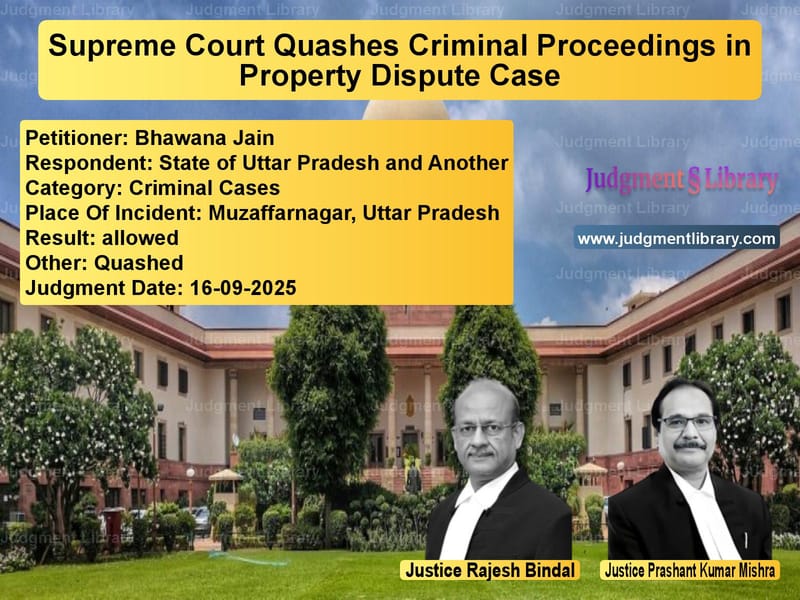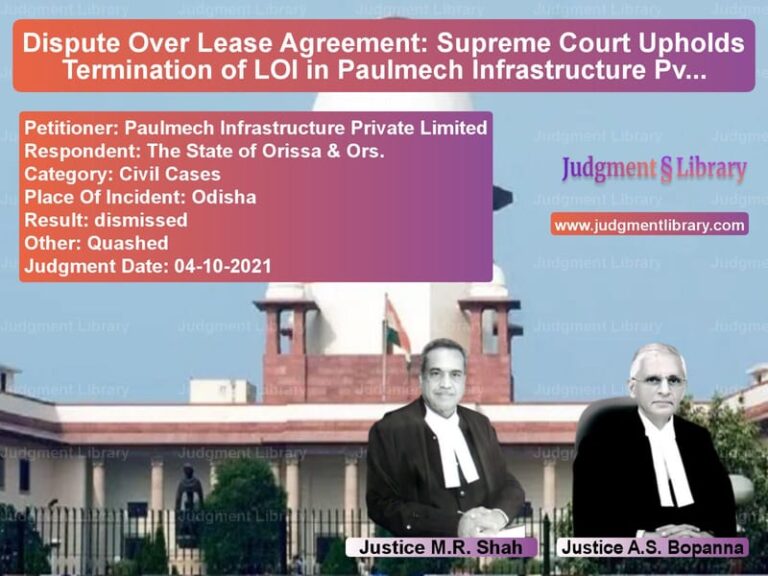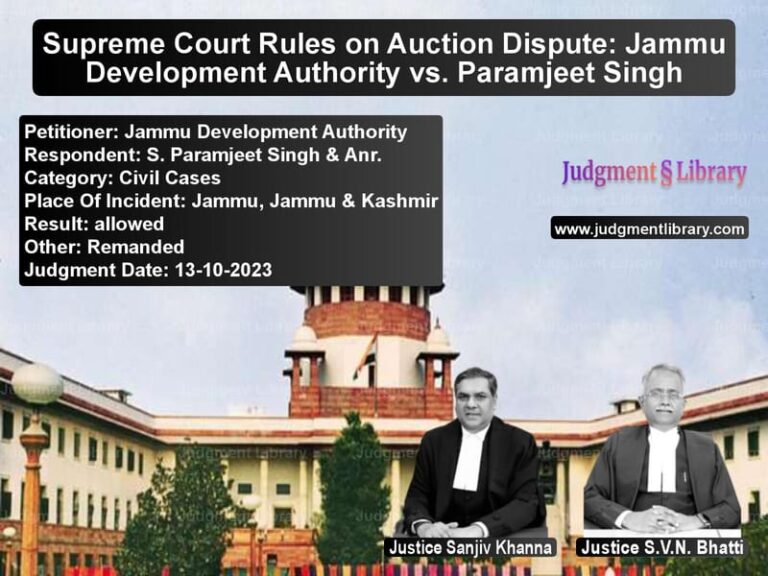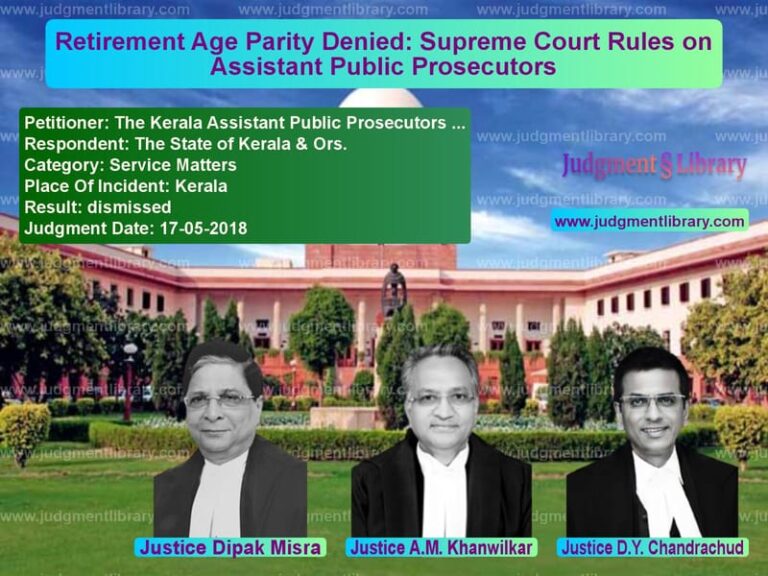Supreme Court Quashes Criminal Proceedings in Property Dispute Case
In a significant ruling that highlights the distinction between civil disputes and criminal offenses, the Supreme Court has quashed criminal proceedings against a woman accused of cheating and criminal breach of trust in a property dispute matter. The case involved Bhawana Jain, who found herself embroiled in criminal litigation years after her husband’s death, despite having no direct involvement in the original property transaction. The judgment delivered by Justices Rajesh Bindal and Prashant Kumar Mishra emphasizes the importance of preventing the misuse of criminal law to settle purely civil disputes and protect citizens from unnecessary harassment.
The dispute originated from a property transaction dating back to 2014 when Bhawana Jain’s late husband, Atul Kumar Jain, jointly purchased Plot No. 70 measuring 240 square yards with Anurag Jain (respondent No. 2). The property was mutually partitioned in February 2015, with the northern portion going to Atul Kumar Jain and the southern portion to Anurag Jain. The crucial fact that emerged during proceedings was that Bhawana Jain’s husband had raised a loan of ₹25 lakhs from Allahabad Bank by mortgaging his share of the property, with Bhawana acting merely as a guarantor. The loan was fully repaid after her husband’s death in 2016, making the entire criminal case against her particularly questionable.
The Legal Battle Unfolds
The legal saga began when Anurag Jain filed his first private complaint in 2018, nearly two years after Atul Kumar Jain’s death. This complaint was investigated by police, who submitted a report clearly stating that the loan was raised against the husband’s share of the property. During the pendency of this complaint, the parties arrived at a settlement on September 29, 2020, and Bhawana Jain even issued a cheque for ₹1,00,000 to Anurag Jain. Based on this settlement, Anurag Jain withdrew his complaint on September 4, 2021.
However, in what the Supreme Court would later characterize as an attempt to “arm-twist” Bhawana Jain, Anurag Jain immediately filed a fresh complaint concealing the fact of the earlier withdrawn complaint. This second complaint led to the registration of FIR No. 506 of 2021 under Sections 406 (criminal breach of trust), 420 (cheating), 504 (intentional insult), and 506 (criminal intimidation) of the Indian Penal Code. The chargesheet was filed on November 25, 2021, and the court took cognizance, summoning Bhawana Jain on February 9, 2022.
The Appellant’s Arguments
Bhawana Jain’s counsel presented compelling arguments before the Supreme Court, emphasizing that “the intention of respondent No. 2/complainant is to harass the appellant and to ‘arm-twist’ her to gain undue benefit, much after the death of her husband.” The counsel highlighted several crucial facts: Bhawana Jain was a cancer patient since 2016, the second complaint was filed with the same allegations without disclosing the earlier withdrawn complaint, and the police report in the first complaint had clearly established that the loan was raised against the husband’s share of property.
The appellant’s counsel argued that “the appellant was merely a guarantor of the loan. It was merely a civil dispute which has been given a different colour.” Regarding the alleged misbehavior on August 30, 2021, the counsel pointed out that “the first complaint was withdrawn by the respondent No. 2/complainant much later on 04.09.2021. Any allegations prior to that will not make out a case for registration of a criminal case.” Most importantly, the counsel stressed that “the alleged violation of any compromise will not result in any criminal liability. Continuation of the proceedings against the appellant would amount to abuse of the process of law and result in unnecessary harassment of the appellant, in which she has no role to play.”
The Respondent’s Position
The respondents, represented by the State of Uttar Pradesh and Anurag Jain, maintained that there was no error in the High Court’s order refusing to quash the proceedings. The respondent’s counsel argued that “the appellant, being a guarantor in the loan raised by her late husband, had knowledge of the entire case, hence, was party to the cheating. She can also be proceeded against independently, even after death of her husband, if the settlement arrived at by the appellant was not adhered to.” This argument sought to establish criminal liability based on her role as a guarantor and alleged non-adherence to the settlement terms.
Supreme Court’s Analysis and Reasoning
The Supreme Court conducted a thorough examination of the factual matrix and legal principles involved. The Court noted several undisputed facts that significantly weakened the prosecution’s case. The property was purchased jointly by Bhawana Jain’s late husband and Anurag Jain in 2014, and the loan was raised in 2015. The Court observed that “the appellant was merely a guarantor to the loan raised by her late husband, which even as per the police report, was against his share of the property.”
The Court made crucial observations about the timeline and conduct of the complainant: “The husband of the appellant died on 15.10.2016. Till that date and about two years thereafter, respondent No. 2/complainant did not raise any issue.” This delay in raising complaints raised questions about the bonafides of the criminal case.
One of the most significant aspects the Court highlighted was the concealment of material facts: “The second complaint was filed without disclosing the factum of the filing and withdrawal of the first complaint concerning the same dispute. Even in the chargesheet filed in pursuance of the FIR in question, there is no mention of the filing and withdrawal of the first complaint for the same dispute.” This concealment was viewed as a serious flaw in the prosecution’s case.
The Court also noted procedural irregularities: “The chargesheet did not elucidate as to how the case was made out against the appellant. Even in the cognizance and summoning order passed by the Court below, no reasons have been assigned as to how a case is made out against the appellant, who was merely a guarantor to the loan, which, after the death of the husband of the appellant, stands settled.”
Read also: https://judgmentlibrary.com/supreme-court-upholds-liberty-principles-in-anticipatory-bail-case/
The Final Ruling
After examining all aspects of the case, the Supreme Court concluded that “From the facts as noticed above no case for summoning the appellant in the complaint was made out.” The Court firmly stated that “continuation of the proceedings against the appellant, in pursuance of the FIR in question will amount to abuse of process of law.”
Accordingly, the Court allowed the appeal and “FIR No. 506 of 2021 dated 04.10.2021 registered at police station Nai Mandi, District Muzaffarnagar and all proceedings subsequent thereto, including the summoning order dated 09.02.2022, stand quashed.”
Broader Implications
This judgment reinforces several important legal principles. First, it emphasizes that criminal law should not be used as a tool to settle purely civil disputes. The Court recognized that the essence of the dispute was civil in nature – relating to property rights and loan transactions – and giving it a criminal color amounted to abuse of legal process.
Second, the judgment highlights the importance of full disclosure in legal proceedings. The concealment of the earlier withdrawn complaint was viewed seriously by the Court, indicating that such conduct undermines the integrity of the judicial process.
Third, the ruling protects individuals from harassment through repeated litigation on the same cause of action. The principle against double jeopardy, though not strictly applicable here, finds resonance in the Court’s disapproval of filing fresh complaints on the same facts after withdrawing earlier ones.
Fourth, the judgment clarifies the limited criminal liability of guarantors in loan transactions. Merely being a guarantor does not automatically make one party to criminal offenses like cheating or criminal breach of trust, especially when the principal borrower has acted within their rights.
This decision serves as a important precedent for similar cases where civil disputes are attempts to be converted into criminal cases, providing relief to individuals facing criminal prosecution for essentially civil matters and reinforcing the judiciary’s role in preventing abuse of legal process.
Petitioner Name: Bhawana Jain.Respondent Name: State of Uttar Pradesh and Another.Judgment By: Justice Rajesh Bindal, Justice Prashant Kumar Mishra.Place Of Incident: Muzaffarnagar, Uttar Pradesh.Judgment Date: 16-09-2025.Result: allowed.
Don’t miss out on the full details! Download the complete judgment in PDF format below and gain valuable insights instantly!
Download Judgment: bhawana-jain-vs-state-of-uttar-prade-supreme-court-of-india-judgment-dated-16-09-2025.pdf
Directly Download Judgment: Directly download this Judgment
See all petitions in Fraud and Forgery
See all petitions in Property Disputes
See all petitions in Legal Malpractice
See all petitions in Judgment by Rajesh Bindal
See all petitions in Judgment by Prashant Kumar Mishra
See all petitions in allowed
See all petitions in Quashed
See all petitions in supreme court of India judgments September 2025
See all petitions in 2025 judgments
See all posts in Criminal Cases Category
See all allowed petitions in Criminal Cases Category
See all Dismissed petitions in Criminal Cases Category
See all partially allowed petitions in Criminal Cases Category







